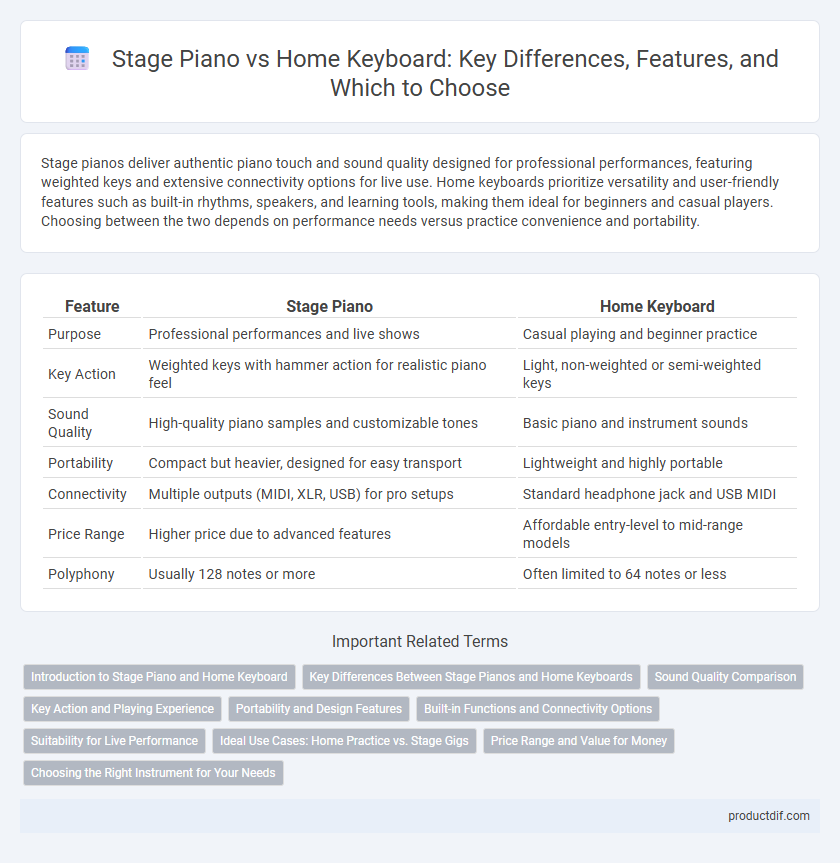Stage pianos deliver authentic piano touch and sound quality designed for professional performances, featuring weighted keys and extensive connectivity options for live use. Home keyboards prioritize versatility and user-friendly features such as built-in rhythms, speakers, and learning tools, making them ideal for beginners and casual players. Choosing between the two depends on performance needs versus practice convenience and portability.
Table of Comparison
| Feature | Stage Piano | Home Keyboard |
|---|---|---|
| Purpose | Professional performances and live shows | Casual playing and beginner practice |
| Key Action | Weighted keys with hammer action for realistic piano feel | Light, non-weighted or semi-weighted keys |
| Sound Quality | High-quality piano samples and customizable tones | Basic piano and instrument sounds |
| Portability | Compact but heavier, designed for easy transport | Lightweight and highly portable |
| Connectivity | Multiple outputs (MIDI, XLR, USB) for pro setups | Standard headphone jack and USB MIDI |
| Price Range | Higher price due to advanced features | Affordable entry-level to mid-range models |
| Polyphony | Usually 128 notes or more | Often limited to 64 notes or less |
Introduction to Stage Piano and Home Keyboard
Stage pianos offer weighted keys and advanced sound engines designed for professional live performance and studio recording, emphasizing authenticity in piano feel and tone. Home keyboards feature lighter keys, built-in learning tools, and a wide range of voices and rhythms tailored for beginners and casual players. Both instruments cater to different user needs, balancing portability, sound quality, and functionality.
Key Differences Between Stage Pianos and Home Keyboards
Stage pianos deliver authentic weighted keys with high-quality piano sounds and robust build designed for live performances, while home keyboards often feature lighter keys and a wider variety of sounds tailored for casual play and practice. Stage pianos emphasize durable hardware, professional connectivity options like balanced outputs and MIDI, whereas home keyboards prioritize portability and built-in learning features. Sound engine quality and key action are critical differences, with stage pianos replicating acoustic piano feel more accurately than most home keyboards.
Sound Quality Comparison
Stage pianos deliver superior sound quality with professional-grade piano samples and advanced speaker systems, offering rich, authentic acoustics ideal for live performances. Home keyboards often feature basic sound engines and smaller, less powerful speakers, resulting in less dynamic sound and limited tonal depth. Musicians seeking studio-level audio fidelity prioritize stage pianos for their expressive touch sensitivity and realistic sound reproduction.
Key Action and Playing Experience
Stage pianos feature weighted keys designed to replicate the feel of an acoustic piano, providing a more authentic and responsive playing experience ideal for professional performances. Home keyboards often have lighter, unweighted keys that facilitate easier finger movement, making them suitable for beginners and casual players. The key action on stage pianos enhances dynamic control and expressiveness, while home keyboards prioritize convenience and portability.
Portability and Design Features
Stage pianos emphasize portability with robust, lightweight designs and solid, durable materials ideal for frequent gigging musicians. Home keyboards prioritize compactness and integrated speakers, designed for ease of use and convenience within domestic environments. Key features such as weighted keys and minimalistic control panels differentiate stage pianos, while home keyboards often include multi-functionality and user-friendly interfaces.
Built-in Functions and Connectivity Options
Stage pianos offer advanced built-in functions such as weighted keys, high-quality sound engines, and comprehensive control panels tailored for live performance, while home keyboards prioritize user-friendly features like preset rhythms and learning modes. Connectivity options on stage pianos commonly include multiple audio outputs, MIDI ports, and USB interfaces suited for integration with professional gear, whereas home keyboards often feature simpler USB or headphone jacks for basic recording and practice. The enhanced functionality and robust connectivity of stage pianos support complex setups, contrasting with the more straightforward design of home keyboards aimed at casual musicians.
Suitability for Live Performance
Stage pianos offer superior sound quality, weighted keys, and robust build, making them ideal for live performance environments requiring expressive play and durability. Home keyboards prioritize versatility and features suitable for practice and casual playing, often lacking the tactile response and sound projection needed on stage. Musicians seeking professional-grade instruments for gigs frequently choose stage pianos for their enhanced portability, connectivity options, and stage-ready design.
Ideal Use Cases: Home Practice vs. Stage Gigs
Stage pianos excel in live performance environments with their weighted keys and professional sound engines, making them ideal for stage gigs and touring musicians. Home keyboards often come with built-in learning tools, lighter key action, and versatile sounds tailored for practice, composing, and casual playing at home. Choosing between them depends on whether the primary use is robust, expressive performances or convenient, multifunctional home practice.
Price Range and Value for Money
Stage pianos typically range from $1,000 to $3,000, offering professional-grade sound quality, weighted keys, and robust build, making them ideal for live performances. Home keyboards are generally priced between $100 and $700, providing versatile features and portability suitable for beginners or casual players. Investing in a stage piano delivers superior value for money for serious musicians requiring durability and authentic piano feel, while home keyboards offer budget-friendly options for practice and entertainment.
Choosing the Right Instrument for Your Needs
Stage pianos offer authentic weighted keys and superior sound quality designed for live performances, making them ideal for gigging musicians seeking realism and durability. Home keyboards provide versatility with built-in learning tools, multiple instrument voices, and compact portability suited for beginners and casual players practicing at home. Selecting the right instrument depends on your performance requirements, budget, and desired features for practice or stage use.
Stage piano vs Home keyboard Infographic

 productdif.com
productdif.com